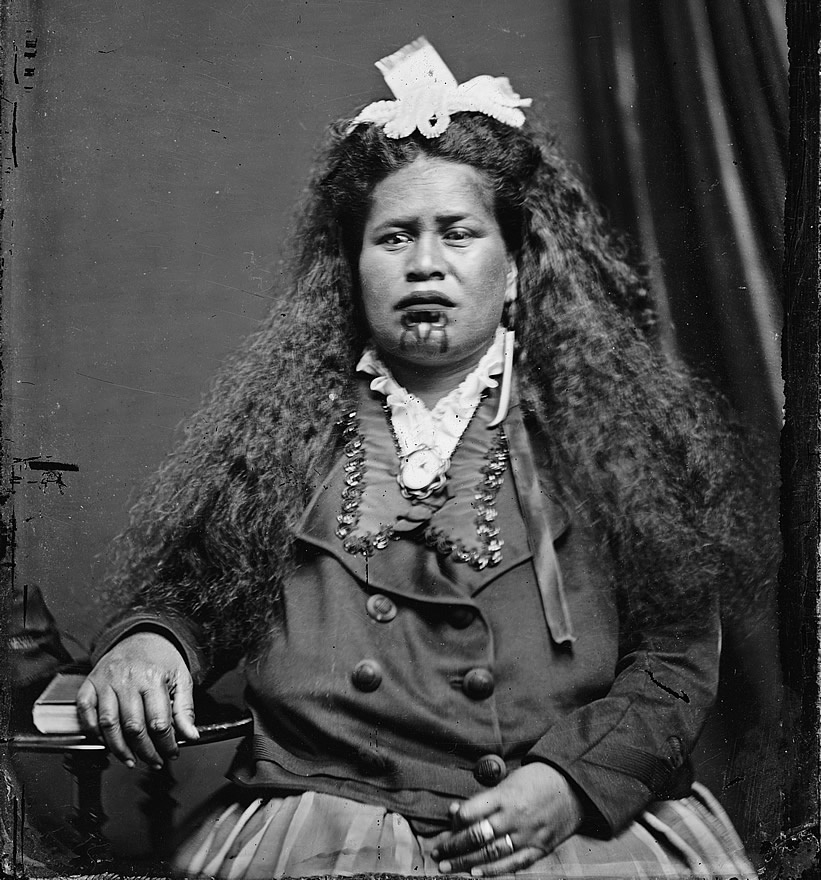
Ākenehi Tōmoana (died 1908)
Ngāi Te Rangiitā, Ngāti Papa-tua-maro, Ngāti Ngarengare, Ngāi Turahi.
Ākenehi was a prominent Māori woman leader of chiefly status. Well-educated and a landowner, she was married to the Heretaunga rangatira Hēnare Tōmoana. She was a strong advocate for women and worked towards women’s rights from multiple angles.
At the heart of the Māori women’s movement were concerns about the well-being of Maori, the loss of land, and restrictions on Maori women’s rights to own land imposed by European laws. ‘Wāhine rangatira’ (women of chiefly status) were used to having decision-making power, but the new European system forced them to find new ways to assert their authority. The Kotahitanga Māori parliament and the Women’s Christian Temperance Union were two new forums in which grievances could be addressed.
In 1893 Ākenehi accompanied Meri Te Tai Mangakāhia when she presented a motion at the Kotahitanga Māori parliament calling for Māori women to be able to vote and stand for parliamentary seats. She argued that as landowners they were entitled to political representation. However, in the afternoon session Ākenehi appears to have suggested delaying consideration of the women’s suffrage petition until more pressing issues had been resolved. [1]
By 1895 Ākenehi was more forcefully advocating for women’s rights. She was part of a group of high-status women, the ‘First Wives of Heretaunga’, who established the Komiti Wahine o Heretaunga. They organised ‘Te Hui Wahine’ at Te Haukē Marae – a forum to discuss women’s suffrage, equal rights for women, prohibition and temperance, and the need to stop selling land. [2]
In her inaugural address at the hui Ākenehi inspired the attending women by saying:
For many years the men, the chiefs, the Members of Parliament, the Kingitanga, have been searching for answers to our issues regarding land and the betterment of our people … they even went to England. … All of this was done without us; the women … and no benefit has come back to our people. … We women have not yet tried! [3]
Ākenehi continued to be politically active as secretary of both Ngā Komiti Wāhine and Te Kotahitanga, in which she worked alongside her husband Hēnare.
[1] Tania Rei, Maori women and the vote, Huia Publishers, Wellington, 1993, p. 19.
[2] Ngātai Huata, ‘Ākenehi Pātoka Rātima Rerepukapuka Tōmoana, Nga taumata: a portrait of Ngati Kahungunu he whakaahua, or Ngati Kahungunu 1870–1906, Huia Publishers, Wellington, 2003, pp. 42–4.
[3] Quoted in Ngātai Huata, ‘Ākenehi Pātoka Rātima Rerepukapuka Tōmoana, Nga taumata: a portrait of Ngati Kahungunu he whakaahua or Ngati Kahungunu 1870–1906, Huia Publishers, Wellington, 2003, pp. 43–4.
Further reading
Angela Ballara, ‘Wahine rangatira: Maori women of rank and their role in the women’s Kotahitanga movement of the 1890s’, New Zealand Journal of History, vol. 27, no. 2, 1993, pp. 127–39
Barbara Brookes, A history of New Zealand women, Bridget Williams Books, Wellington, 2016
Sandra Coney, Standing in the sunshine: a history of New Zealand women since they won the vote, Penguin Books (NZ), Auckland, 1993
Nga Taumata: a portrait of Ngati Kahungunu he whakaahua or Ngati Kahungunu 1870–1906, Huia Publishers, Wellington, 2003
Tania Rei, Maori women and the vote, Huia Publishers, Wellington, 1993

Community contributions